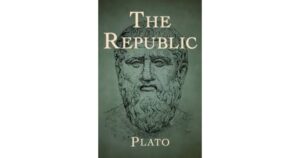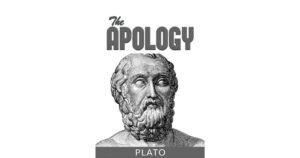Plato and His Important Works| The Republic
Plato, a Greek philosopher who lived from 428-348 BCE, made significant contributions to various fields, including literature and criticism. His philosophical ideas continue to influence literary theory and criticism to this day.
He wrote many works, mostly in the form of dialogues, where he explores various philosophical concepts and ideas.
Table of Contents

Here are some of his most notable works:
- The Republic: Explores the nature of justice, morality, and the ideal society.
- The Symposium: Discusses the nature of love and beauty.
- The Apology: Presents the speech of Socrates at his trial, exploring the nature of wisdom and knowledge.
- The Crito: Examines the nature of justice and morality in the context of Socrates’ imprisonment.
- The Phaedo: Explores the nature of the soul and the concept of immortality.
- The Phaedrus: Discusses the nature of love, beauty, and the soul.
- The Parmenides: Examines the nature of reality and knowledge.
- The Theaetetus: Explores the nature of knowledge and perception.
- The Sophist: Discusses the nature of reality and the concept of the “sophist”.
- The Statesman: Examines the nature of politics and the ideal ruler.
- The Laws: Presents a comprehensive philosophy of law and governance.
- The Timaeus: Explores the nature of the universe and the concept of creation.
- The Critias: Presents a mythical account of the creation of the world.
- The Philebus: Discusses the nature of pleasure and the good life.
- The Protagoras: Examines the nature of knowledge and reality.

Other notable works include:
- The Euthyphro
- The Gorgias
- The Meno
- The Cratylus
- The Phaedo
- The Laches
- The Charmides
These works showcase his vast range of philosophical interests and his method of exploring complex ideas through dialogue and debate.
The Allegory of the Cave:
In his most famous work, “The Republic,” Plato presents the Allegory of the Cave, which explores the nature of reality, perception, and knowledge. This allegory has been interpreted as a commentary on the role of literature in society. Plato argues that literature can either enlighten or deceive, depending on its ability to convey truth.
The Theory of Forms:
Plato’s Theory of Forms posits that abstract concepts like beauty, justice, and goodness are more fundamental than the physical world. This idea has implications for literary criticism, as it suggests that literary works should strive to capture eternal, universal truths rather than fleeting, particular experiences.
Mimesis:
His concept of mimesis (imitation) is central to his literary criticism. He argues that literature should imitate the ideal, eternal Forms, rather than the imperfect, physical world. This idea has influenced literary theorists, such as Aristotle, who developed the concept of mimesis further.
Critique of Poetry:
In “The Republic,” he critiques poetry for its potential to deceive and corrupt. He argues that poets often prioritize style over truth, leading to a distorted view of reality. This critique has sparked debates about the role of literature in society and the responsibility of writers to convey truth.

Why Plato banished poets from his Ideal Republic?:
- Deception: Plato believed that poets deceive people by presenting false or misleading representations of reality.
- Imitation: He argued that poetry is mere imitation (mimesis) of the physical world, rather than a reflection of eternal, universal truths.
- Emotional manipulation: Plato saw poetry as a means of manipulating people’s emotions, rather than appealing to their reason.
- Lack of knowledge: He believed that poets lack true knowledge and understanding, instead relying on inspiration and intuition.
- Corruption: Plato thought that poetry could corrupt people, especially the young, by presenting immoral or unjust ideas as acceptable.
- Competition with philosophy: He saw poetry as a rival to philosophy, which he believed was the superior means of seeking truth and wisdom.
In Book X of “The Republic,” Plato argues that poets should be banned from the ideal city because they:
- Create false images of the gods and heroes
- Encourage immoral behavior
- Appeal to emotions rather than reason
- Lack knowledge and understanding
- Corrupt the youth
Plato believed that his ideal Republic should be governed by reason and wisdom, and that poetry, with its emphasis on emotion and imagination, was a threat to this goal.
Plato’s take on drama is largely critical, and he expresses his views in several of his works, particularly in “The Republic” and “The Laws”.
Plato’s View of Drama:
- Mimesis: Plato argues that drama is a form of mimesis (imitation), which he sees as a flawed way of representing reality.
- Falsehood: He believes that drama often presents false or misleading representations of reality, which can lead to a distorted view of the world.
- Emotional manipulation: Plato thinks that drama manipulates people’s emotions, rather than appealing to their reason.
- Immorality: He argues that many dramas portray immoral behavior, such as violence, lust, and deceit, which can corrupt the audience.
- Lack of knowledge: Plato believes that dramatists lack true knowledge and understanding, instead relying on inspiration and intuition.
- Competition with philosophy: He sees drama as a rival to philosophy, which he believes is the superior means of seeking truth and wisdom.
- Danger to the city: In “The Republic”, Plato argues that drama can be dangerous to the city, as it can lead to a decline in moral standards and a lack of respect for authority.
In “The Laws”, Plato proposes a strict regulation of drama, suggesting that:
- Dramas should be censored: to ensure they conform to moral standards.
- Dramatists should be trained: in philosophy and morality to ensure they produce works that promote virtue.
- Drama should be used for education: to promote moral values and civic virtue.
Overall, Plato views drama with suspicion, seeing it as a potential threat to the moral and philosophical values he promotes.

Influence on Literary Criticism:
Plato’s ideas have shaped literary criticism in several ways:
- Focus on universal themes: Plato’s emphasis on eternal, universal truths has led critics to focus on the timeless themes and ideas presented in literature.
- Importance of literary form: Plato’s Theory of Forms has influenced critics to consider the literary form and structure as essential to conveying meaning.
- Ethical considerations: Plato’s critique of poetry has led critics to evaluate literature’s ethical implications and potential impact on society.
In conclusion, Plato’s contributions to literary criticism are profound and far-reaching. His ideas continue to influence literary theory and criticism, encouraging critics to consider the eternal, universal truths conveyed through literature.
Read and learn more: 48 Interesting Figures of Speech for You.







One thought on “Plato and His Important Works| The Republic”